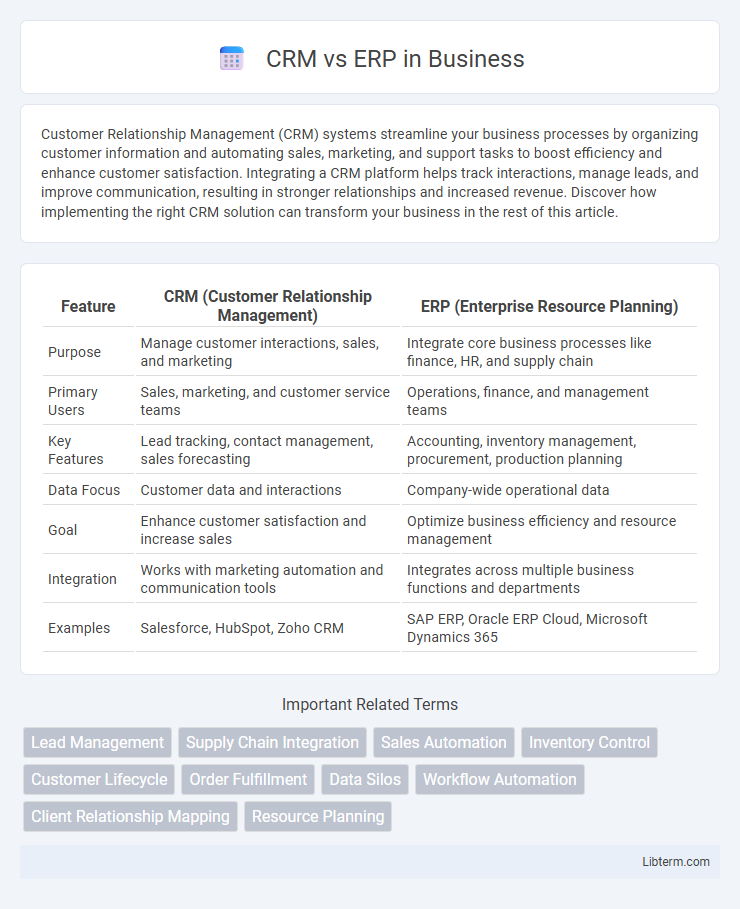Customer Relationship Management (CRM) systems streamline your business processes by organizing customer information and automating sales, marketing, and support tasks to boost efficiency and enhance customer satisfaction. Integrating a CRM platform helps track interactions, manage leads, and improve communication, resulting in stronger relationships and increased revenue. Discover how implementing the right CRM solution can transform your business in the rest of this article.
Table of Comparison
| Feature | CRM (Customer Relationship Management) | ERP (Enterprise Resource Planning) |
|---|---|---|
| Purpose | Manage customer interactions, sales, and marketing | Integrate core business processes like finance, HR, and supply chain |
| Primary Users | Sales, marketing, and customer service teams | Operations, finance, and management teams |
| Key Features | Lead tracking, contact management, sales forecasting | Accounting, inventory management, procurement, production planning |
| Data Focus | Customer data and interactions | Company-wide operational data |
| Goal | Enhance customer satisfaction and increase sales | Optimize business efficiency and resource management |
| Integration | Works with marketing automation and communication tools | Integrates across multiple business functions and departments |
| Examples | Salesforce, HubSpot, Zoho CRM | SAP ERP, Oracle ERP Cloud, Microsoft Dynamics 365 |
Introduction to CRM and ERP
CRM (Customer Relationship Management) systems focus on managing customer interactions, sales processes, and marketing campaigns to enhance customer satisfaction and drive revenue growth. ERP (Enterprise Resource Planning) solutions integrate core business functions such as finance, supply chain, human resources, and manufacturing into a unified platform to improve operational efficiency and data accuracy. Both CRM and ERP technologies streamline business workflows but target different aspects of organizational management, with CRM centered on customer engagement and ERP on internal process optimization.
Key Differences Between CRM and ERP
CRM (Customer Relationship Management) systems focus on managing customer interactions, sales, and marketing processes, enhancing customer satisfaction and retention. ERP (Enterprise Resource Planning) integrates core business processes such as finance, supply chain, and operations to improve overall efficiency and data accuracy. Key differences include CRM's customer-centric approach versus ERP's enterprise-wide resource management and their distinct functionalities tailored to sales versus operational workflows.
Core Functions of CRM Systems
CRM systems centralize customer data management, enabling sales teams to track leads, manage contacts, and automate communication workflows. These platforms enhance customer service through ticketing systems, personalized marketing campaigns, and customer behavior analytics. Core CRM functionalities streamline sales pipelines, improve customer retention, and boost overall revenue by fostering stronger client relationships.
Core Functions of ERP Systems
ERP systems centralize core business functions including finance, supply chain management, human resources, and manufacturing operations to streamline processes and improve organizational efficiency. By integrating data across departments, ERP enhances real-time decision-making and resource planning, reducing operational costs. Unlike CRM, which targets customer relationship management, ERP offers a comprehensive platform to manage enterprise-wide activities.
Benefits of Implementing CRM
Implementing CRM systems enhances customer relationship management by centralizing customer data, enabling personalized communication, and improving sales strategies. CRM integration drives higher customer retention rates, increases sales conversions, and boosts overall customer satisfaction through targeted marketing efforts. Businesses gain actionable insights with CRM analytics, leading to more effective decision-making and streamlined sales processes.
Benefits of Implementing ERP
ERP systems integrate core business processes such as finance, supply chain, and human resources into a single platform, enhancing operational efficiency and data accuracy. Implementing ERP improves real-time visibility across departments, enabling better decision-making and resource management. Companies experience reduced operational costs and streamlined workflows, resulting in increased productivity and competitiveness.
CRM vs ERP: Which Does Your Business Need?
Choosing between CRM and ERP depends on your business goals: CRM systems focus on managing customer relationships, sales, and marketing automation to enhance customer retention and revenue growth. ERP systems integrate core business processes such as finance, supply chain, and inventory management to improve operational efficiency and resource planning. Businesses aiming to boost customer engagement should invest in CRM, while those seeking streamlined internal operations benefit more from ERP solutions.
Integration Between CRM and ERP
Integration between CRM and ERP systems enables seamless data flow across marketing, sales, and operations, improving customer insights and operational efficiency. Synchronizing customer information, order processing, inventory management, and financial data eliminates redundancies and ensures real-time accuracy. This interconnected approach enhances decision-making, accelerates sales cycles, and supports a unified view of business performance.
CRM and ERP Use Cases by Industry
CRM systems excel in industries like retail and financial services by enhancing customer relationships through personalized marketing and sales automation. ERP solutions are critical in manufacturing and supply chain sectors, streamlining operations, inventory management, and financial reporting. Both CRM and ERP integrate effectively in healthcare, improving patient management and operational efficiency.
Choosing the Right Solution: CRM, ERP, or Both?
Selecting the right solution depends on organizational needs: CRM systems excel in managing customer relationships, sales, and marketing automation, while ERP platforms integrate core business processes like finance, supply chain, and human resources. Companies aiming to enhance customer experience and sales efficiency benefit from CRM, whereas those seeking comprehensive oversight of operations and resource planning require ERP. In many cases, integrating both CRM and ERP delivers a unified approach to optimize customer management alongside operational efficiency.
CRM Infographic

 libterm.com
libterm.com